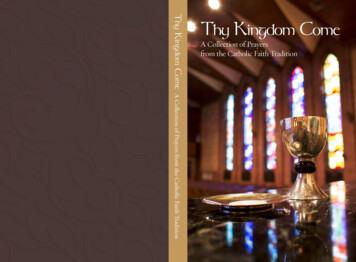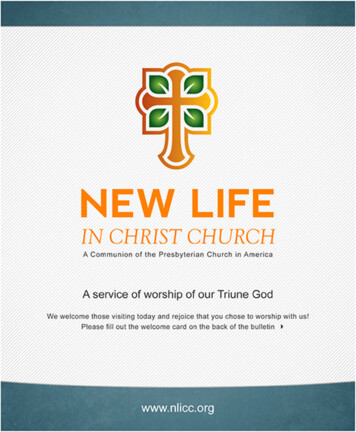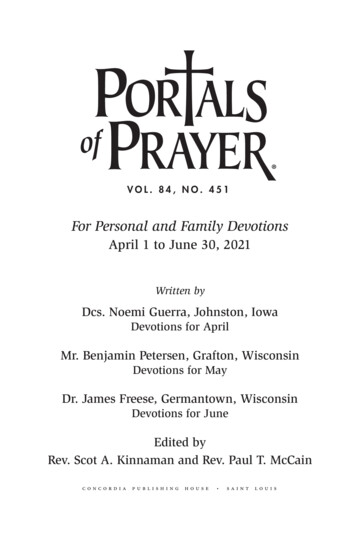
Transcription
2
2
“I can never forgive you after what you’ve done to me!”“I can never forgive myself for what I did.”“You tell me God can forgive me but I can’t see how He could afterall I’ve done.”I’m sure you’ve heard people say such words or maybe you’ve saidthem yourself. I’m sure there have been times when a friend, lovedone or partner has needed to forgive you for something you’ve saidor done! Perhaps you want to forgive someone but are looking for aneasy way out.REAL FORGIVENESS DOESN’T COME EASILY!Forgiving another person may be one of the hardest things we do.We also need to ask if our words of forgiveness have been reallygenuine! Real forgiveness does not come easily! If you asked a wife if she could forgive her husband who hasleft her with his three children who dearly loved him, she wouldmost probably reply: “I will never forgive him.” A church member, who 20 years ago took a large amount ofmoney from his boss and never repaid it, can’t forget and can’tforgive himself. He wants to know what to do since his formerboss is no longer living.The scenarios are endless. Forgiveness is never cheap. Sometimes itnever seems to stop costing.2
Forgetting the event often seems harder than forgiving it. People say,I’ll forgive you but I will never forget.” That may not be realforgiveness. While we may never be able to erase the incident fromour memory, real forgiveness means that we choose not to allow thememory of what happened to infect our relationship with the personor persons concerned.WHAT DO WE MEAN BY FORGIVING?A dictionary defines the word ‘forgive’ by describing the actionsinvolved: To cease to feel angry or resentful towards another personor group, to pardon an offender or an offence, to remit or let off.’This does not go far enough! Something more needs to be donemore positively. The broken friendship or relationship needsrestoring.The word ‘forgive’ is actually two words to ‘give for’. It means replacing the result of a wrong action orwords with that which has been lost. The loss might be a friendshipor a relationship or a situation which has been ruined by wrongwords or actions that have been offensive, hurtful or insulting.Where someone has been truly forgiven a relationship can usually berestored. It must be admitted, however, that while it takes only oneto forgive, reconciliation always takes two.3
WHAT IS INVOLVED IN FORGIVINGS?Dr. Charles Stanley said: “Forgiveness is the act of setting someonefree from an obligation to you that is a result of a wrong doneagainst you. Forgiveness involves three elements: an injury, real orimaginary; a debt or negative reaction resulting from the injury; andfinally a cancellation of that debt or reaction.”Jay Adams said, “When a person forgives another, he is promising todo three things about the intended wrongdoing: not to use it againstthe wrongdoer in the future; not to talk about it to others; and not todwell on it himself.” Remember -forgiveness is the key to realfreedom.AN UNKNOWN WORD?Wesley Thiessens, a Bible translator among the Bora people of Peru,tried to find a word or phrase in their language which wouldtranslate the Bible word ‘forgive’. At last he asked the tribes people:“What word would you say if a judge let you off and didn’t punishyou in any way?” The people understood and gave him what was acommon expression in their language: “He leaves off what heshould charge us.” Wesley Thiessens knew he had his words for‘forgiveness’.Early translators among the Eskimos had a similar difficulty. In theend they invented a word. It took 24 letters but its meaning wasclear. ‘Not being able to think about it anymore.’ In our Englishlanguage we know the word - ‘forgive’- and we think we know itsmeaning, but are we really ready to forgive those who may act orspeak against us?4
THE FIRST USE OF THE WORD?We may well wonder when and how the word entered our language.Maybe in the garden of Eden! Perhaps when Adam and Eve realisedthey had done wrong in eating the forbidden fruit? Was it then thatthey asked God to forgive them?It could have been when God spoke to them when Adam and Evewere covered with the animal skins. Maybe God said, “What you didwas wrong. But your sin is covered and I forgive you!” If so, the resultwould have been restored fellowship.We could have learned this word when our mother took us in herarms after we had done something wrong and she said: “I forgiveyou”. She gave us her love and friendship in place of punishment.Perhaps she used this wonderful word of restoration after we hadsaid we were sorry for what we had done. It is one of the mostpowerful words in any language.IS FORGIVING HARD TO DO?Many of us find it difficult to say ‘I am sorry’.Sometimes it’s even harder still to say: ‘I forgive you’. A survivor ofa concentration camp in World War II told how, as a boy, he watchedhis relatives being killed. He later wrote a shocking5
book entitled -‘I cannot forgive.’Many people would feel the same way. Which is harder:1.Forgiving others?2.Accepting forgiveness?3.Asking to be forgiven?4.Forgiving yourself?FORGIVING CAN BE DIFFICULT!There are times when we know we should forgive someone but wedon’t. One reason could be that we want the other person to take allthe blame so that we appear to be the innocent one. Or perhaps wemay have contributed to the incident involved but we don't want toadmit it. In a husband and wife situation, for example, one personoften wants to place most of the blame on the other person for whathappened. It is also hard sometimes deciding if one person is theguilty one and the other entirely innocent.There are many reasons why it is sometimes difficult to forgiveanother person for what has happened, or even to say, ‘I am sorry.’But if we are a believer in Jesus Christ, the Holy Spirit, who liveswithin us, can give us the grace, strength and power to forgive or toseek forgiveness.6
FORGIVING OTHERSAccording to a recent study by the University of Michigan USA, olderpeople are more likely to say they are sorry for their mistakes thanyounger people. Women are more forgiving than men! Only 52% ofthose surveyed said they can usually forgive others. There's an oldsaying, Time heals all wounds’. Not necessarily. Some wounds neverheal and are carried to the grave. Only true forgiveness guaranteeshealing of personal wounds.WHAT DID JESUS SAY?The Bible says much about forgiving others, especially in the light ofhow God has forgiven us. Jesus Christ spoke at length about thisaspect of forgiveness. In one of His personalparables, (Matthew 18:23-35) Christ told the story of a rich king whodiscovered one of his servants owed him literally millions of dollars.When he found this out, he ordered that the servant and his familybe sold into slavery. The servant immediately begged the king fortime to pay all he owed. Graciously the king forgave him the entiredebt.The forgiven servant then found a man who owed him only a fewdollars, and treated him shamefully, forgetting all the king had donefor him. When the king heard this, he withdrew his royal pardon andhad the ungrateful man sent to prison. We would agree he deservedit.7
CHRISTS WORDS TO US ALLChrist spoke often about our need to forgive others.Look at this phrase in the ‘Lord’s Prayer' - forgive us as we forgivethose who sin against us.” (Matthew 6:12) We do not earn God’sforgiveness by forgiving others, but in the same generous, loving,continuing way in which God deals with us, we, as His children, mustlearn to forgive others. We expect God to act quickly when we askfor forgiveness. We are generally much slower to forgive those whooffend us.Christ also said, “If you forgive those who sin against your HeavenlyFather will forgive you. But if you do not forgive men their sins, yourHeavenly Father will not forgive your sins.” He did not mean we canearn forgiveness but rather God cannot overlook an unChristlike,unforgiving spirit. When we act in such a way, it is our fellowshipwith Him which suffers and becomes blocked. Forgiving othersopens the door of intimate fellowship once again.A WONDERFUL EXAMPLEPerhaps one of the greatest examples Christ gave of forgiveness is inthe second half of the story of the Prodigal Son in Luke 15. Theyounger son had left home, ignoring the love and kindness of thefather. When he wasted every penny he had been given and finallyfinished up in a pig-pen, he decided to return home to work for hisfather. But his father had never stopped watching for him to returnhome. When the son came into sight, the waiting father ran out tohim, took him in his arms and gave him a warm welcome.8
There was no doubt about the father's forgiveness. A sad and tragiccontrast is seen in the attitude of the older brother.WHAT ELSE DOES THE BIBLE SAY?Our attitude and our actions must be seen in the light of God’swonderful, undeserved forgiveness offered to us and made possiblethrough Christ’s death. The Bible uses the same words for humanforgiveness as it does for God’s forgiveness.There are many references in the Gospels regarding the commandthat we forgive others. The case of the unforgiving servant has beenmentioned. That story grew out of Peter’s question - “Lord, howmany times do I have to forgive my brother (who has hurt me)?Don’t you think, Lord, that seven times is enough?” (Matthew 18:21)We don’t know why Peter asked that question nor who he wasreferring to as ‘his brother’ The term‘brother’ could mean arelative, a neighbour, or a person from the same country ornationality. But it must have been a serious, continuing situationwhich demanded forgiveness seven times over.Christ gave Peter an immediate, strongly worded, unexpectedanswer: “Never limit your forgiveness of another person to seventimes 一 keep on forgiving — 490 times if necessary."9
Then Christ gave the parable already referred to about theungrateful, unforgiving servant. The main point of that story is this:‘as we have been forgiven, let’s make sure we are ready and willingto forgive others in the same way.’ Have we ourselves learned thatlesson yet? Or are we waiting until we ‘feel like forgiving’?When you think of the greatness of God’s forgiveness of our sins,past, present and future, simply because we asked Him to do so (onthe basis of Christ’s death for us) surely we can find the graceneeded to forgive whatever someone has done or said about us. Ifwe can’t do that maybe it’s because we don’t want to!CHRIST’S EXAMPLEThe greatest examples of forgiveness is seen at Calvary. When thesoldiers started nailing Christ to the cross, He said “Father, forgivethese men. They really don’t know what they are doing.” (Luke 23:34)Reading the text, it would seem Christ kept on saying that until theexecutioners had finished their terrible work. Remember, the onewho spoke those words is still the one who can help us say, ‘I forgiveyou.’After terrible experiences in a concentration camp in World War II,Corrie Ten Boom told how she felt she must preach everywhere thepossibilities of forgiveness, even to those who had been incrediblycruel under the Nazi regime. Then one morning after a service inMunich, a man approached her and held out his hand.10
Suddenly she recognised him as the worst and cruelest guard of all inthe camp where she was imprisoned. He had treated the womenshockingly. Her hand froze at her side. How could she forgive himand take his hand?Standing there, Corrie prayed: “Lord I cannot forgive this man.Please forgive me.” Immediately, she said later,she felt forgiven.Then, in the power of that forgiveness, she reached out her hand andgrasped the hand of her enemy of years ago and forgave him all thathe had done. Corrie knew the release which comes With forgiving. Itwas the key to freedom from the past. Do you need to use that key?Lewis Smedes said; “We are never so free as when we reach backinto our past, and forgive a person who caused us pain.”THE TEACHING OF PAUL AND OTHERSIn several letters to the various churches, the Apostle Paul spokeplainly yet lovingly about our conduct toward fellow believers. Forexample, look at the beautiful words of Ephesians 4:32: “Be kind andcompassionate to one another, forgiving each other,just as inChrist, God forgave you: Compassion means moving toward anotherwith outstretched hands. Paul was writing to a church when hepenned those words. A Bible believing church is the one place wherewe should expect to find forgiving and forgiven people. Sadly, therecan be so much conflict in a local church.11
Some of it can be over rather minor matters such as being ignored oroverlooked.But in more serious differences, members can be deeply hurt andoften leave that church. Some may join another group, butsometimes others are lost to the cause of Christ. This is a tragedyindeed, and the outside world looks on and sees this and wonderswhy.Again Christ gave explicit directions regarding such a situation. TheMessage’ Bible of Eugene Paterson paraphrases Matthew 18:15-16in these words: ‘If a fellow believer hurts you, go and tell him - workit out between the two of you. If he listens, you've made a friend. Ifhe won’t listen, take one or two others along so that the presence ofwitnesses will keep things honest and try again. If he still won’t listen,tell the church. If he won't listen to the church, you’ll have to startover from scratch. Confront him with the need of repentance, andoffer again God’s forgiving love.'THIS IS NOT EASYYou will need to spend time in prayer before taking any specificaction about this kind of problem. Enlist two or three others to praywith you. Make sure those friends will keep the whole matterconfidential and also will not ‘take sides’. Do what you can to avoidopen controversy. Nothing harms a church more than having twomembers out of fellowship with each other.What can you do? Start praying now about any situation or problemlike this in which you or your church may be involved.12
Richard Foster said it well: “Forgiveness means that the power oflove that holds us together is greater than the power of the offensewhich separates us.”FORGIVING AND FORGETTINGOften a person may sincerely forgive another person for what theymay have done or said and may have even said; “Let’s forget aboutit and go on with our lives.”But is it easy to forget some deep wrongthat has hurt you very much? To erase that wrong completely fromyour mind will never be easy, but try honestly to put it behind you.Then whenever a thought of that incident comes to your mind, youshould quickly say to yourself – ‘that’s in the past and I’m not goingto bring it up again. I am not going to think about it after all this time.’Ask God to help you put it behind you and to keep it there. He willhelp you if you ask Him. He said that about our sins which He hasforgiven: “Your sins I remember no more.” (Hebrews 8:12) By that Hemeans He will not hold those sins against you ever again. Isn’t thatwhat we need to do also?FORGIVING OURSELVESMany of us have said “I will never forgive myself” because of guiltyfeelings. Often after a loved one dies, the remaining partner or friendhas expressed a nagging, continuing feeling of guilt over the possibleneglect of the loved one. Again this kind of ‘self-guilt’ must be dealtwith or it can become devastating to the one concerned.13
Self-forgiveness begins with the mental or spoken acknowledgementthat you may possibly have done wrong or offended someone. Youmay call it ‘appropriate guilt’ but remember it may be unjustified.Look at the matter squarely or seek professional help immediately.You may not be at fault in any way. There could be serious physicalor mental consequences of not dealing with this type of feelings.Left untreated, this could also lead to 'spiralling guilt'. Feelings candeepen and multiply and even cause what is called the 'paralysis ofguilt’. The person concerned seems unable to act in a normal way.Again, professional help is needed to enable him/her to face thereality of life and come to the place of forgiving themselves andothers. Only then can they get on with living.Talk to the Lord about this burden. Ask for His forgiveness andbelieve you have it. By faith say: “I believe God has forgiven me. Ican’t go back on the past but I am going to go forward with Christ.”Remember - forgiveness is the key to freedom.How thrilling to see someone released from a burden of guilt.Forgiving yourself for past actions or words is enormously importantfor your own well-being. Don’t let the wrong actions of yesterdayrule and ruin your life today.14
LET’S REVIEW THIS ASPECT AGAINMaybe you’ve said, ‘I know that God has forgiven me and I am sure Ihave forgiven those who may have hurt me or blamed me forsomething. But I can’t forgive myself. I just don’t have any peace inmy heart.’ Many struggle with this problem. Sins - serious sins committed years and years ago keep coming back to them, robbingthem of true peace of heart.The apostle Paul could have known this problem but refused to allowit to occupy his mind. He told of his past - even called himself ablasphemer - but said, ‘Forgetting those things which are behind, Ipress on.’ (Philippians 3:13) Don’t let Satan keep bringing up to youwhat happened in the past. Satan’s voice is always one to condemn.When the Holy Spirit speaks to you, His voice will be one ofconviction but He will not leave it there. He will point you to Christand to the cross where your sins were dealt with and cleared away. Ifyou feel you need to do so, ask God to forgive whatever it was.Remember you don’t need to keep on asking Him to forgive you. Achild does not keep on asking a parent to forgive! Then believe whatHis Word says, “lf we confess our sins, He is faithful and just toforgive us our sins - all of them,in the past and even the present and to cleanse us.” Read again 1 John 1:9. Ask God to give you afresh gift of faith and peace. He can do it and will do it if you takeHim at His Word.15
A WONDERFUL RELEASEA husband could not forgive himself for an incident in which his wifesuffered a heart attack and died suddenly. In seeking to help him, Isuggested there were three people involved. First, God, second, hiswife, and third, himself.I asked him; “You believe God has forgiven you if (and that is theword - “if”)you were possibly involved in any way. Right?” Heagreed he had asked God to forgive him. He believed God had doneso. Next I asked him about his wife - safe home in Heaven – “Do youthink she blames you in any way?” He said no. He was sure she washappy in Heaven. I said, “Then only you remain. You have asked Godto forgive you if you were involved in any way. Your wife is safehome in Heaven. You need to accept what God has done. Forgetabout blaming yourself.” When he saw that position, it changed hiswhole attitude. Praise God the change was quickly seen in his life.THE CERTAINTY OF GOD’S FORGIVING POWERThe need to forgive ourselves is absolutely essential if we are toshow the reality of Christ and God's forgiveness in our lives. ThePsalmist said, “He does not treat us as our sins deserve. As far as theeast is from the west, so far has He removed our transgressions from,us.” (Psalms 103:10, 12) Another passage says that “He has buriedour sins in the depth of the sea" (Micah 7:19). Someone said "Heerected a sign which said NO FISHING.”16
If that is how God has dealt with our sins why do we go on lookinginward and focus only on what we may have done or not done in thepast? Let’s return to 1 John 1:9 – “If we confess our sins He is faithfuland just to forgive us our sins.”Believe those words - if you finddifficulty in doing so, ask the Lord to help you believe them and Hewill.REMEMBER: BEING FORGIVEN IS THE KEY TO FREEDOM1.Being forgiven can be a wonderful joy.2.Forgiving others is a blessing and a release.3.Not to forgive can bring disaster.4.God’s forgiveness is there for the asking.Have you seriously asked God for forgiveness of your sin? If not — itis so simple. Here is how:1. Confess you are a sinner, needing forgiveness. (Again 1 John 1:9)2. Ask God to forgive you - if you are sincere God will forgive youimmediately.3. Believe God has forgiven you and received you into His family(John 1:12)Read the words of 1 John 1:9 again: “If we confess our sins, He (God)is faithful and just to forgive us our sins and to cleanse us from allunrighteousness.” You do your part and God will do His. Start readingyour Bible, believing what you read.17
It will bring you peace as you believe what God has said in His Word.Go and talk to your pastor or minister at your local church and tellhim your story. Most of all believe what God has said and trust Himfor each day for the rest of your life here on earth.Remember, forgive those you need to forgive.Forgive yourself for past events Trust God forforgiveness and for the future.Never forget - FORGIVENESS IS THE KEY TOFREEDOM.18
Christ also said, "If you forgive those who sin against your Heavenly Father will forgive you. But if you do not forgive men their sins, your Heavenly Father will not forgive your sins." He did not mean we can earn forgiveness but rather God cannot overlook an unChristlike, unforgiving spirit. When we act in such a way, it is our fellowship










